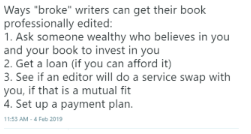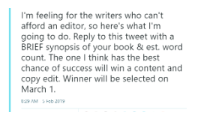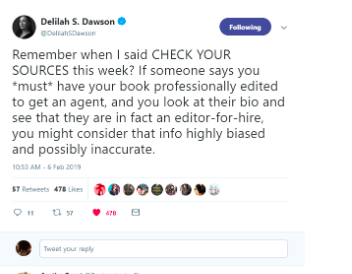A Word from some #WritingCommunity Editors on that one Tweet . . .
Good evening #WritingCommunity! Two Doctors Media Collaborative and Overhaul My Novel, aka, C. D. Tavenor and Meg Trast, would like to discuss the recent outcry from within our community regarding the price of editorial services and particular editorial practices.
We want to emphasize that no one can predict the whims of the literary market. Given all the thoughts flying around regarding the dos and don’ts of editing, self-publishing, and traditional publishing, we thought a brief message from two freelance editors might provide an introspective, alternative look, one that’s significantly different from what sparked this hoopla.
And what, exactly, happened? Well, on February 4, 2019, an editor on Twitter (we’ll call her Kathy) said the following:
Note: To respect people’s privacy, we’ve kept both the original poster and subsequent commenters’ identities anonymous.
Twitter (understandably) lashed out, including responses from high profile authors like N. K. Jemisin and Delilah S. Dawson (more on her later). Following the initial feedback, Kathy said:
Kathy also added later, “only enter this contest if you are low income and can honestly not afford to pay a professional editor. Let’s give a low income writer a chance of success…”
These two tweets combined ignited a firestorm across twitter, including responses like:
“My ‘day job’ is a college student. I can’t afford to hire an editor. I believe I can be published. Please don’t take out a loan to get an editor. Just PLEASE don’t.”
“PLEASE do not be fooled by this. This is the same predator who called writers who don’t pay for editing “fools,” poverty shamed, and then suggested debt to pay for editing. Editors are not agents or publishers. Her opinion on “best chance” is shit. Worthless. Just like her.”
And so, eventually, the wonderful Delilah S. Dawson jumped into the fray!
As freelance editors, we also viewed these tactics as shameful to our business. Simply put, they exemplify predatory practices. We believe in a better way, and we know most editors agree with us, not with the tactics utilized above.
What constitutes predatory editing practices?
First and foremost, an editor should never ask you to go beyond your means. It is naturally the dream of every author to become wildly successful! Unfortunately, there are plenty of predatory businesses on the World Wide Web that prey upon those hopes and dreams. We’re sure you’ve heard of vanity presses: organizations claiming to help you “publish” your book—for a fee. The writing community often calls out and publicly shames these “businesses,” and for good cause!
What about predatory editors, though? Like the twitter post alluded to previously, some editors might claim that you can never find success unless you have your book edited by someone who has worked with bestselling authors or publishers. This is simply not true; many successful books make it to the bookshelf of your favorite, local bookstores with typos still on the pages! Is this ideal? Definitely not. However, having an unedited book doesn’t necessarily spell failure. There are other pitfalls that go along with not having your book professionally edited, but we’ll get more into that below.
If an editor suggests a loan in order to pay for your edit, you may be looking at predatory behavior. As with any respectable business, most editors are not going to expect you to go into debt for your book, especially if you are a first-time author with no idea what success you will experience upon publication.
Further, an editor simply cannot guarantee that your book will sell. Whether you are self-publishing or going a traditional route, editors are not publicists or agents. We can, potentially, provide some insights into the current market, but insight does not equal predictability. An editor should not be attempting to convince you that their way is the only way; this is a hardcore sales tactic, and all they want is your money.
Do they insist that you can afford it but simply don’t want to cough up the dough? Suggest that you borrow money from a bank, or even a friend? Tell you that you are less than intelligent for refusing an offer, or insinuate you are in the wrong for not accepting a service? All of the above are manipulation tactics meant to guilt you into spending money.
The “True” costs of editing . . .
Do not be mistaken; professional editing does not come cheap, even from freelance editors. It doesn’t need to cost your financial security, though! On average, you should be paying around 1.5 cents or less per word, depending upon the type of service you are seeking and the work needed on your manuscript. During our research, we have found some of the pushier practices charging upward of 2.5 cents/word, almost twice the industry average. Yes, these are the very same editors who suggest you should go into debt for your first book.
To go from the numbers below: if your manuscript can be edited at 2,000 words per hour, and your editor is charging $25/1k as a base, you are paying them at least $50/hour.
Let’s be fair: some of these editors are more charging for their connections within the industry than the work itself. We also have not sampled these services, so they could be quite good! However, even a great service with industry connections is not worth going into thousands of dollars in debt.
When taking the traditional route, you will hardly ever see the cost of editing because the publisher is likely to take on a majority of that work. When self-publishing, this is where you see how big the numbers actually are, even from reasonably-priced editors.
A good, in-depth edit is both time-consuming and exhausting. As an author, you surely already know this! Some words won’t fit together correctly, and some thoughts just can’t be articulated. And, if you’re used to writing rather than editing or revising, the process becomes mind-numbing. Editors specialize in making words do what they’re told! Even for us, though, it takes time and effort.
Let’s say your editor can tackle around 1,000-2,000 words per hour; what they charge by word count should equal an hourly wage at any job. So, if your editor charges $10/1,000 words, they are, essentially, charging you $10/hour. In the case of some freelance editors who do this as a side or evening time job, making a 100% profit from what they charge you, this is still a very low rate, all things considered. If they are closer to 2,000 words an hour, this becomes a more realistic and worthwhile venture.
What about your manuscript, though? How far along are you? There are many cases where it could take an hour to work on as little as 250 words. This is, of course, more in early/developmental stages, or with novice authors who still have much to learn. Some editors won’t take on manuscripts like this, but most will. If your editor is charging $10/1k, though, and they are working at a rate of 250 words per hour? They are making $2.50/hour.
This does not, of course, include the cost of any printing, travel, shipping, website/email management, or any other associated costs with running a small business. A full-time editor must consider these things, as well as any other costs such as marketing (how did you find your editor?) and time spent sending out quotes and samples for potential clients who haven’t even agreed to use their services.
A Professional Approach to your Writing Career
First, after reading the rest of this blog, we encourage everyone to go read Delilah Dawson’s most recent post on the “Business End of Writing.” She’s a genius and has everyone’s best interests at heart.
But, for the purposes of this discussion, we want to emphasize that, regardless of your income level, you have the opportunity to find success in the writing world if you approach it professionally. If you’re writing just as a hobby, telling stories without a worry about whether you succeed, then you don’t need to stress the cost of editing. If you’re pursuing writing because you want it to make you money, you must invest more time and money into your work.
Whether you self-publish or traditionally publish, you must spend money to make money. You cannot expect to sit down, write a perfect story, put it on Kindle Unlimited, and have it magically sell without any investment. At the same time, you can’t throw money to the wind without knowing your potential return-on-investment.
Sit down and sketch out your finances. Consider how much you make and how much you’re willing to spend on your writing. Here’s an example of the investments C. D. Tavenor’s made (and will need to make) for his upcoming novels:
Book covers
Editing
IngramSpark listings
ISBNs
It all comes out to nearly $1000, and he’s managed, fortunately, to snag significant discounts on some services. Additionally, that cost is before his marketing and website budgets come into play. Remember, even if you land a traditional publisher, you might still pay for some marketing on your own dime (take a look at some of the things Delilah S. Dawson paid for in her thread linked above)!
What’s the catch, then? C. D. Tavenor has no idea if he’ll succeed. It’s a major risk, and not a risk everyone can financially take.
Above all else, we emphasize that, if you’re approaching writing professionally, you must find a route that doesn’t financially destroy you. If you can’t foot the cost to self-publish because you’re still a student or don’t have a job that provides disposable income, DO NOT DO ANY OF THE FOLLOWING:
Take out a loan to fund your novel (unless you have a stable income that will allow you to pay it off, even if your novel tanks);
Self-publish without consulting critique partners, beta readers, or, at the very least, receiving a sample edit from an editor (this can help you pinpoint some arcing issues, even if you don’t wind up employing them);
Fall prey to the clutches of vanity presses (for a list of reputable indie publishers, check out this fantastic resource from the Alliance of Independent Authors).
Instead, consider all of the following:
Pursue traditional publishing until you have the income to self-publish if you don’t land an agent or publisher. It’s a zero-cost game. It might take more time to find high quality critique partners as opposed to paying an editor, but you can still create a polished manuscript. Authors pursuing traditional publishing can utilize an editor to break through writing blocks at the content or developmental stage, or they might suck at self-editing and want a copy editor to help them remove filler words. But does the manuscript need to be immaculate for an agent’s eyes? No.
Try your hand at the short story market first, selling stories there to fund larger, more costly ventures. A lot of markets pay eight to ten cents a word, which equals a few hundred dollars for a three to four thousand word story.
Put your story in front of many eyes as possible, including critique partners, beta readers, and family members. Will they catch every mistake? No. But if you’re serious about self-publishing even if you can’t afford an editor, This might work.
But our number one rule? Do not let your writing career destroy your life. You write because you enjoy it, and you believe you have stories to tell that will entertain people and make them think. If that passion wrecks your financial security, you will lose the fire to write. So, if you can’t afford editing, or don’t want to self-publish without an immaculate manuscript, just keep on writing and pursuing the dream of traditional publishing.
Maybe you’ll step into a job sometime soon that allows you to pay an editor (remember, there are affordable editors out there; not all of them cost $25 for 1000 words). Maybe you’ll hit it big with an agent. Be smart, and don’t fall for the flashy smile that draws you in with a stick masquerading as a carrot.





